events
2012 jan | apr | jun | jul | 2013 mar | apr | jul | oct
| 2014 apr | may | jul | nov
| 2015 mar |
jul |
dec |
2016 jan | feb | apr
The Event Page will be updated as more information become available. Please check back regularly or contact Ingrid Hartl
|
25-26
April
2016
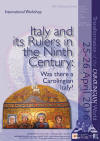
programme
|
International Workshop
Italy and
its Rulers in the Ninth Century:
Was there a Carolingian Italy?
Should you wish to attend the workshop,
please inform us
by e-mail in
advance!
Conference Venue:
Hotel Mercure Wien City
Hollandstraße 3
1020 Wien
Participants
Giuseppe Albertoni
François Bougard
Tom Brown
Roberta
Cimino
Paolo Delogu
Stefano Gasparri
Caroline Goodson
Cristina LaRocca
Tom Noble
Dorine van Espelo
Flavia de
Rubeis
Elina Screen
Marco Stoffella
Francesco Veronese
Giorgia Vocino
|
|
|
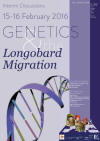
programme
|
Interim Discussions
Genetics & the Longobard Migration
Conference Venue:
Hotel Mercure Wien City
Hollandstraße 3
1020 Wien
Participants
Irene Barbiera
David Caramelli
Patrick Geary
Silvia
Ghirotto
Caterina Giostra
Susanne Hakenbeck
István Koncz
Johannes Krause
Zuzana Loskotová
Balázs Gusztáv Mende
Alessandra Modi
Walter Pohl
Cosimo Posth
Stefania Vai
Krishna Veeramah
Tivadar Vida
Daniel Winger
Peter Stadler
|
|
|
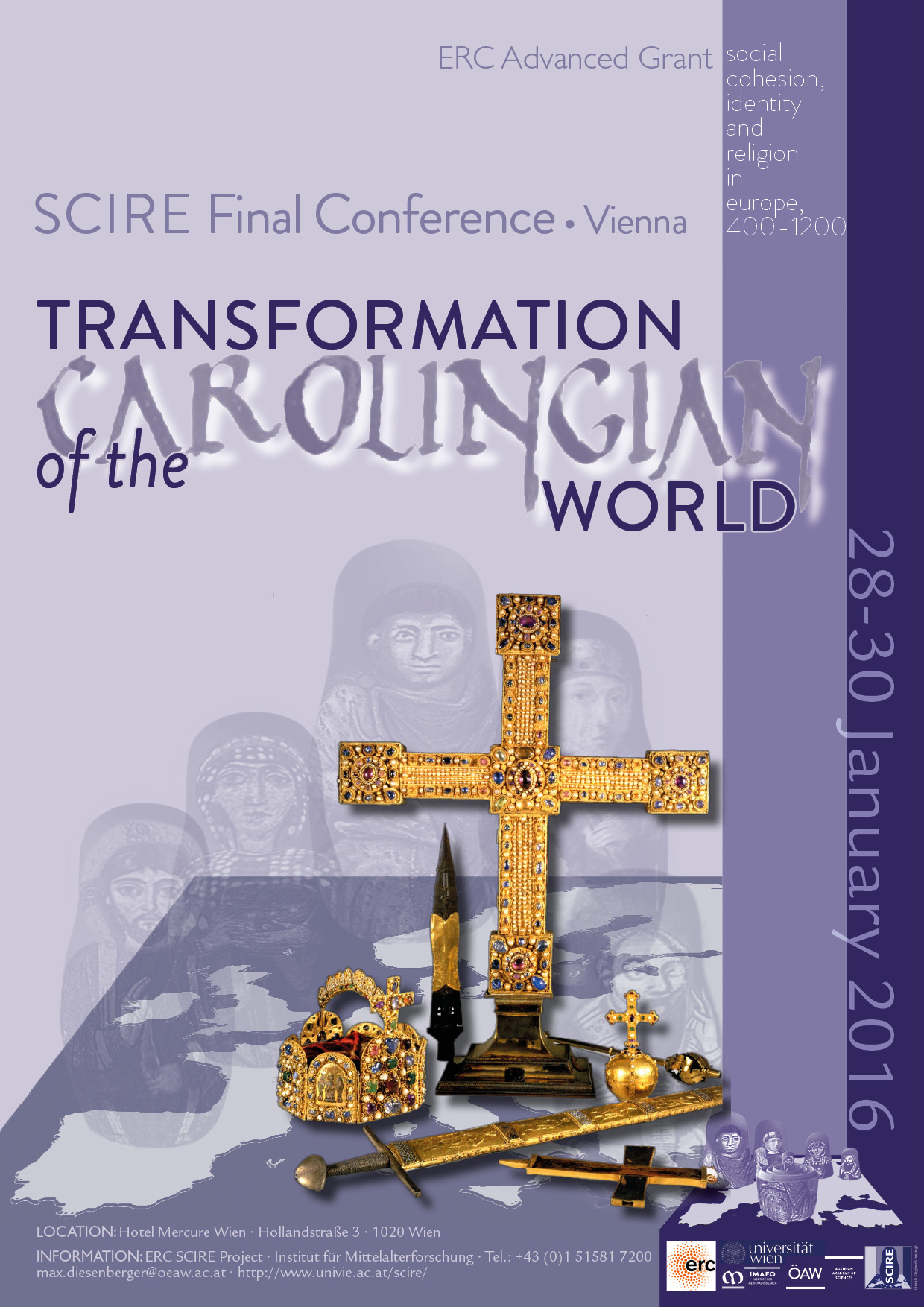
programme
|
Final Conference
Transformation
of the
Carolingian World
Location:
Hotel Mercure Wien City
Hollandstraße 3
1020 Wien
Participants
Stuart Airlie
David Bachrach
Francesco Borri
François
Bougard
Geneviève Bührer-Thierry
Richard Corradini
Wendy
Davies
Jennifer R. Davis
Philippe Depreux
Maximilian
Diesenberger
Stefan Esders
Patrick Geary
Eric Goldberg
Sarah Hamilton
Thomas Kohl
Maria Cristina La Rocca
Conrad
Leyser
Simon MacLean
Rob Meens
Steffen Patzold
Walter
Pohl
Helmut Reimitz
Nicolas Schroeder
Peter Štih
Karl
Ubl
Celine Wawruschka
Charles West
Herwig Wolfram
|
|
Workshop
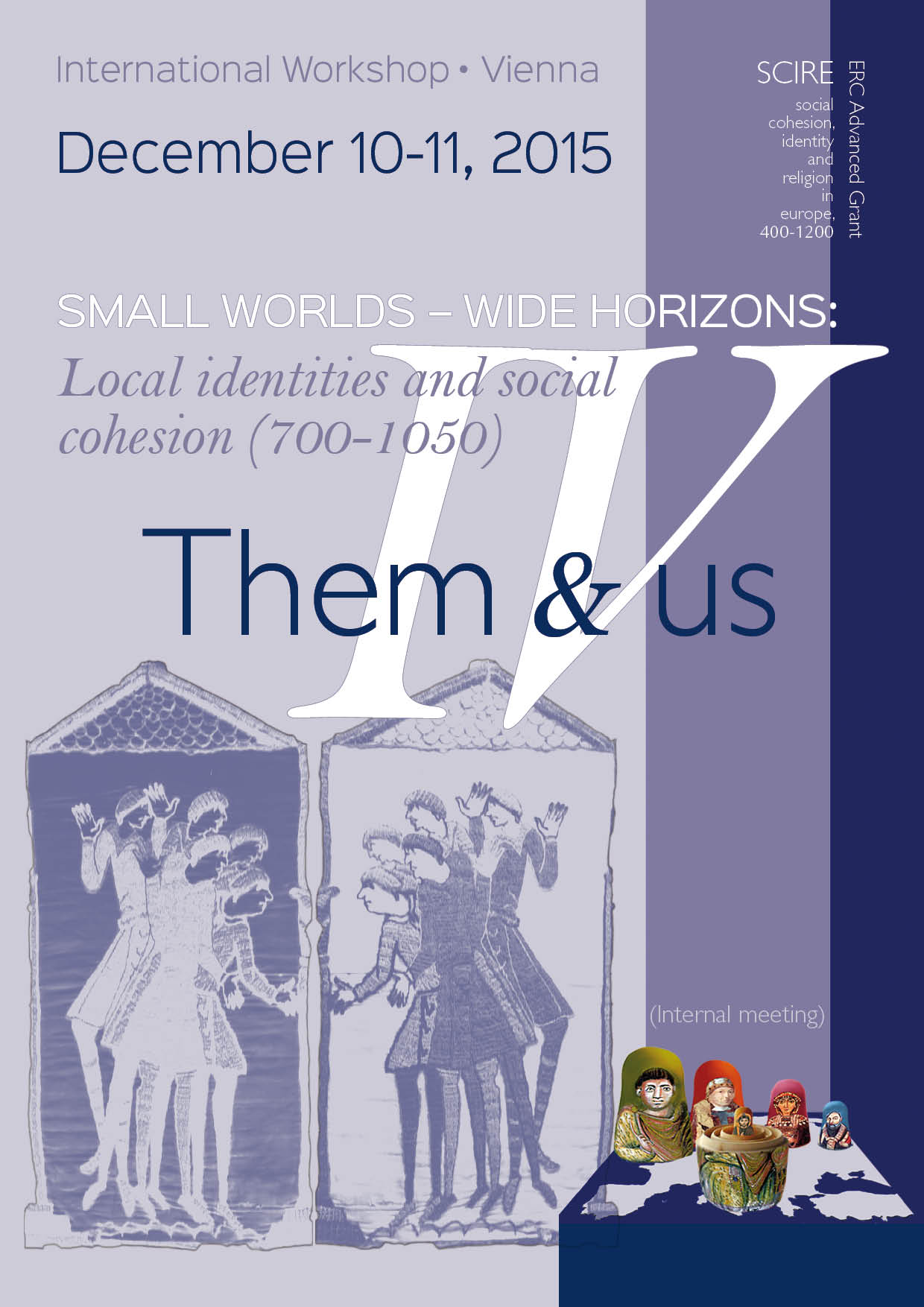
programme
|
Small Worlds-Wide Horizons:
Local identities and social cohesion (700-1050) IV:
Them & us
Internal meeting
Institut für Mittelalterforschung
Wohllebengasse 12-14
1040 Wien
Seminar Room • Ground Floor
Participants
Miriam Czock
Wendy Davies
Steffen Patzold
Marco
Stoffella
Carine Van Rhijn
Nicolas Schroeder
Charles West
Bernhard Zeller |
|
International
Medieval
Congress
Leeds
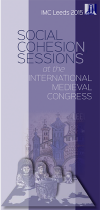
more information
|
Session 1008: Social Cohesion, I:
Graeme
Ward • IMAFO, öAW
Singing From the Same Hymn Sheet? Amalarius of
Metz’s Liber de ordine antiphonarii and Social Cohesion
Clemens
Gantner • IMAFO, öAW
Love and Marriage. Louis II’s Role in His
Brother’s Marriage Controversy and Its Impact on Italy
Caroline Goodson • Department of History, Classics & Archaeology,
Birkbeck, University of London
City-States in Early Medieval
Southern Italy
Session 1108: Social Cohesion, II:
Cinzia Grifoni • IMAFO, öAW
Hic et nunc: Early Medieval
Social Perceptions in Latin Grammatical Works
Bojana Radovanovic •
IMAFO, öAW
Hierarchia in the Service of Social Cohesion:
Different Interpretations of St Paul’s Epistle to the Romans by
Carolingian Authors
Ingrid Hartl • IfG, Universität Wien
Multilingualism in Middle High German Literature
Session 1308: Social Cohesion, III:
Philipp Dörler • IfG, Universität
Wien
Biblical History as a Tool of Integration and Distinction in
Gothic Historiography
Matthias M. Tischler •IfG, Universität Wien
Iberian Bible Manuscripts as Modes of Transcultural Historical
Perception
Patrick Marschner • IMAFO, öAW
Bible and Biblical
Exegesis in the Transcultural Iberian Historical Writing
Session 1606: Social Cohesion, IV:
Mark Jobling • Department of
Genetics, University of Leicester
Magic Bullet or Blank?: What
Genetics Can Tell Us About the Past
Francesca Conselvan • IfG,
Universität Wien
Archaeological and Genetic Evidence for the
Anglo-Saxon Migration
Celine Wawruschka • IMAFO, öAW
The
Beginning of a Wonderful Friendship: German and British Perspectives
on Anglo-Saxon Ethnogenesis
|
|
International lecture series:
Transformation of the Carolingian World
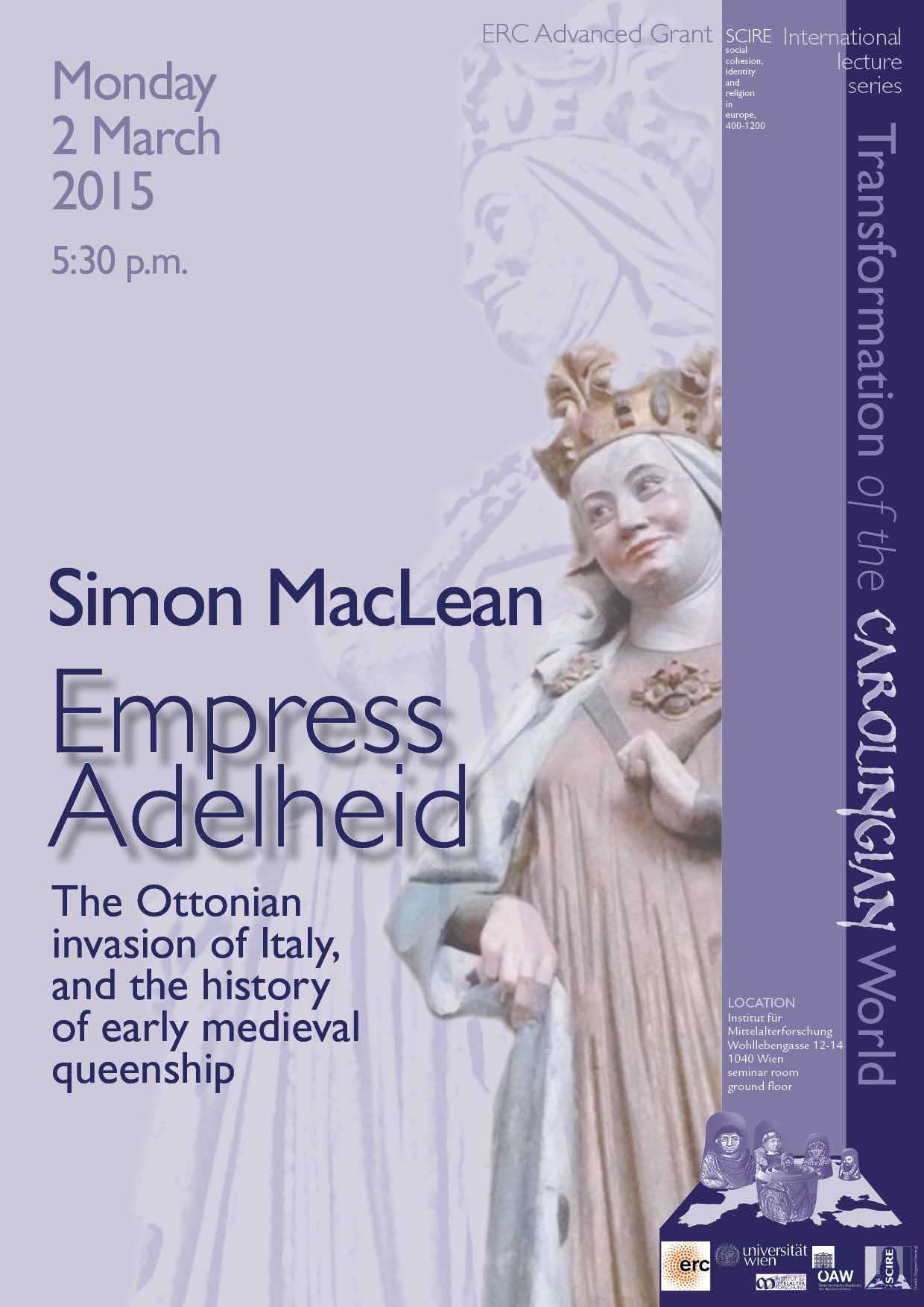
|
Simon MacLean
Empress Adelheid
The Ottonian invasion of Italy,
and the history of
early medieval queenship
Institut für Mittelalterforschung
Wohllebengasse 12-14
1040 Wien
Seminar Room • Ground Floor
▲ up |
|
International Workshop
Vienna
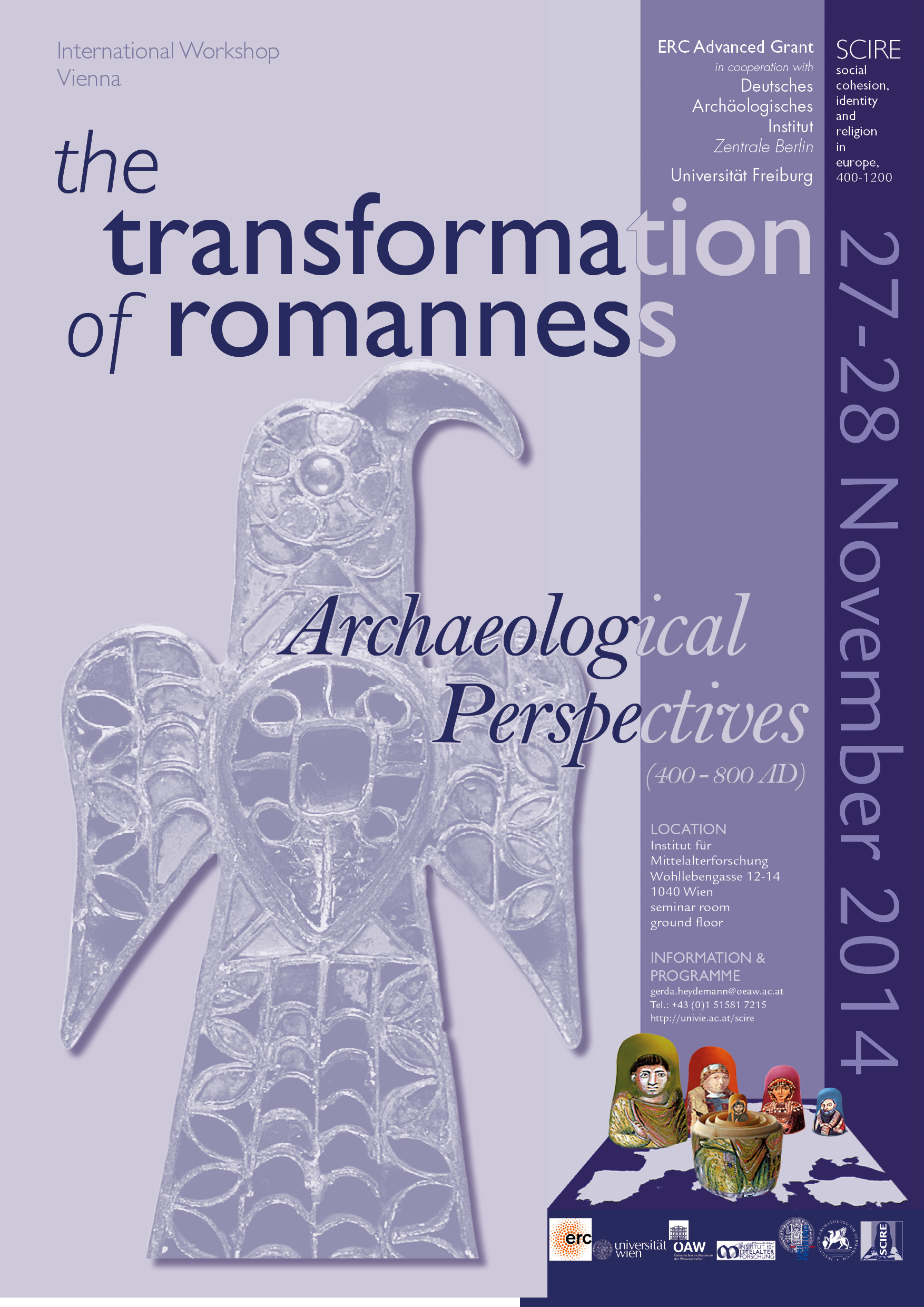
Programme |
Being Roman after Rome 6
Transformation of Romanness
Archaeological Perspectives (400—800 AD)
Institut für Mittelalterforschung • Wohllebengasse 12-14
1040 Wien
Seminar Room • Ground Floor
Participants
Walter Pohl
Philipp von Rummel
Hubert Fehr
Sebastian Brather
Guy Halsall
Claudia Theune-Vogt
Greg Woolf
Frans Theuws
Rodica Oanta-Marghitu
Juan Antonio Quirós Castillo
Mihailo Milinkovic
Tivadar Vida
Riccardo Santangeli Valenzani
Stefan Esders
Orsolya Heinrich-Tamaska
Thomas Otten
Irene Barbiera
Sabine Ladstätter
Rainer Warland
Helga Sedlmayer
Andreas Schwarcz
Bernhard Palme
Roland Steinacher
Laury Sarti
Fritz Mithoff
Stefan Eichert
Herwig Friesinger
Michael Alram
Peter Štih
Celine Wawruschka
Gerda Heydemann
▲ up |
|
International
Medieval
Congress
Leeds

|
Andreas Fischer
Session 127: Texts and Identities, I:
Germanus between Episcopacy and Papacy
Philipp Dörler
Session 227: Texts and Identities, II:
The Regnum Gothorum and the Others: Isidore's Historia (de regibus) Gothorum as a Biblical History?
Clemens Gantner
Session 327: Texts and Identities, III:
'Removing the holy Pope Martin from the church of the Saviour': The Uses of the Arrest and Trial of Pope Martin I in Roman Sources, 7th-9th Centuries
Marianne Pollheimer
Session 527: Texts and Identities, IV:
Instructions, Institutions, and Interpretation: Junillus Africanus in the Carolingian Period |
|
Additional Workshop Vienna
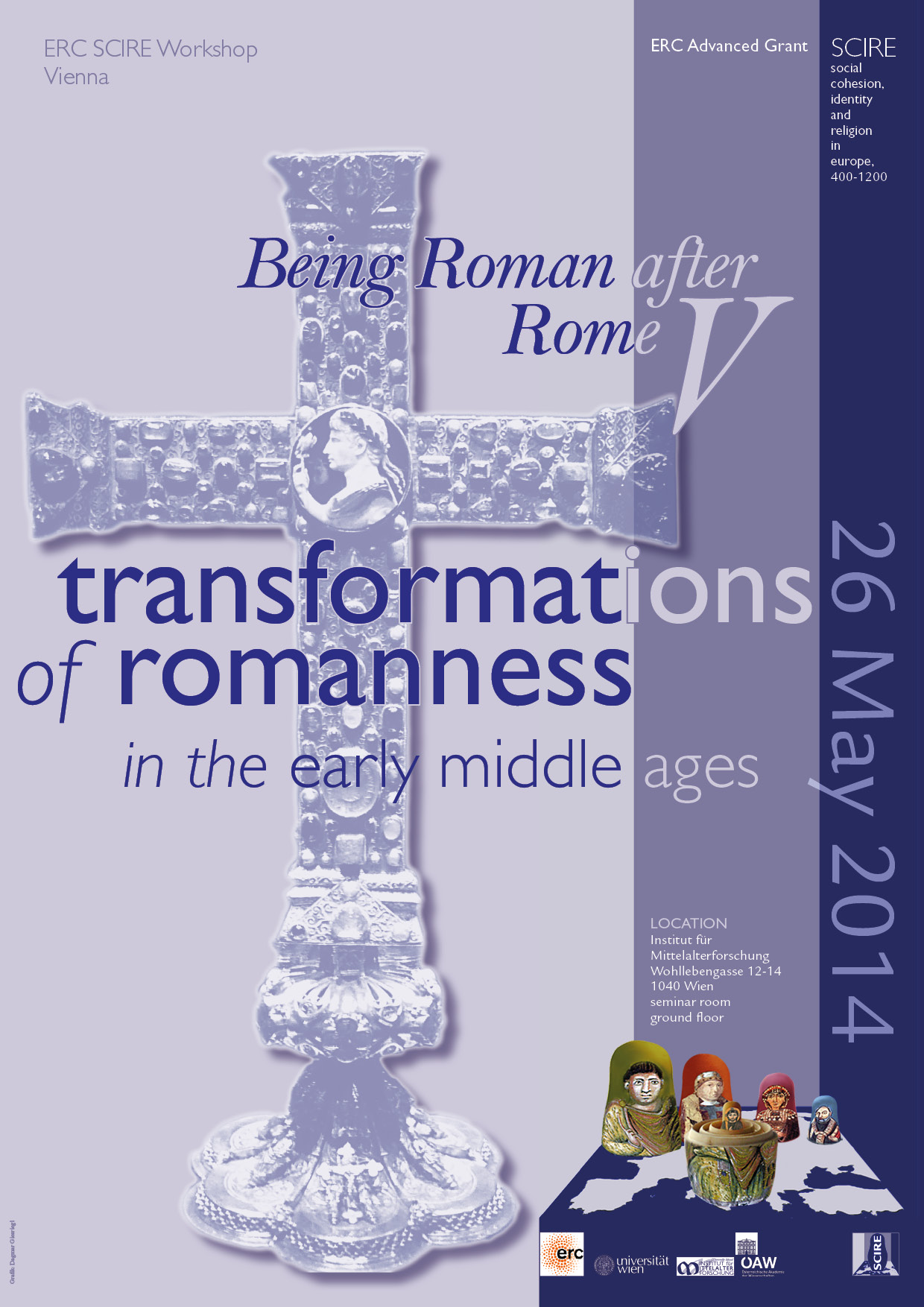
|
Being Roman after Rome 5
Transformations of Romanness
in the Early Middle Ages
Institut für Mittelalterforschung • Wohllebengasse 12-14
1040 Wien
Seminar Room • Ground Floor
Programme
|
Participants
- Paolo Delogu
- Ralph Mathisen
- Ian Wood
- Giorgia Vocino
- Ann Christys
|
|
Workshop
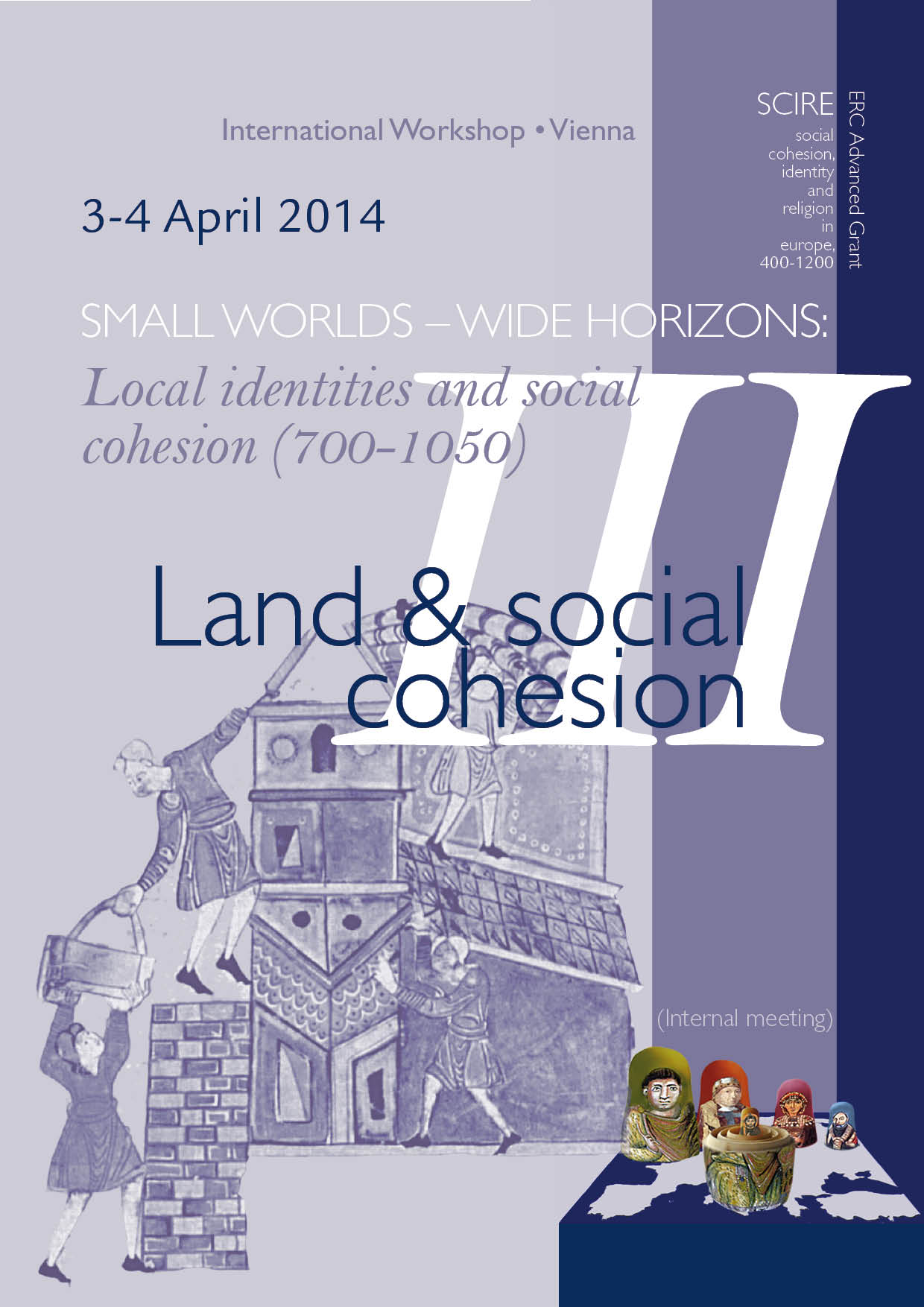
|
Small Worlds-Wide Horizons:
Local identities and social cohesion (700-1050) III:
„Land & social cohesion “
Internal meeting
Institut für Mittelalterforschung • Wohllebengasse 12-14
1040 Wien
Seminar Room • Ground Floor
Programme
▲ up
|
|
International
Conference
Vienna
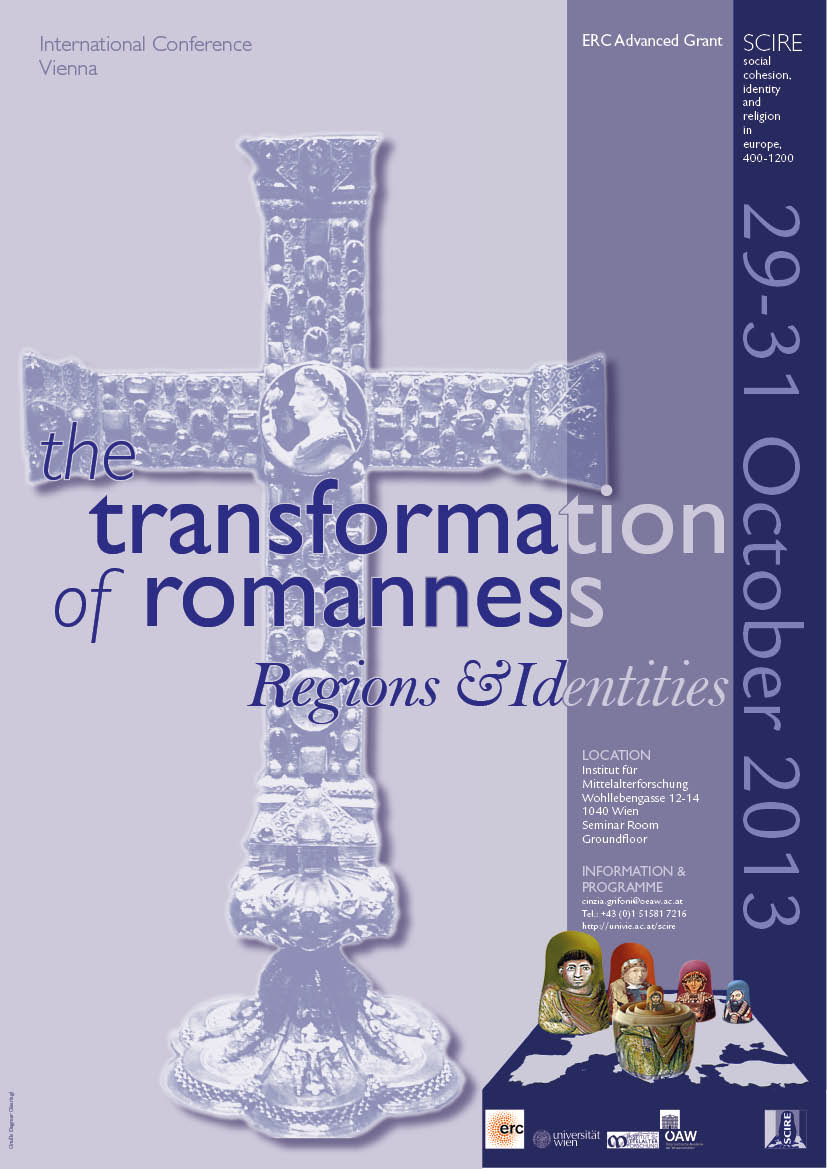
|
Being Roman after Rome 4
The Transformation of Romanness:
Regions & Identities
Institut für Mittelalterforschung • Wohllebengasse 12-14
1040 Wien
Seminar Room • Ground Floor
Due to a fire-drill the conference will start at 3 p.m.
We apologize for this delay and any inconvenience this may cause.
Programme
|
Participants
- Javier Arce Lille
- Francesco Borri Wien
- Lukas Bothe Berlin
- Richard Corradini Wien
- Robin Fleming Boston
- Thomas Granier Montpellier
- Guy Halsall York
- Yitzhak Hen Beer-Sheva
- Johannes Koder Wien
- Jamie Kreiner Princeton
- Rosamond McKitterick Cambridge
- Fritz Mitthof Wien
- Bernhard Palme Wien
- Annick Peters-Custot Saint-Etienne
- Walter Pohl Wien
- Helmut Reimitz Princeton
- Laury Sarti Berlin
- Roland Steinacher Wien
- Ioannis Stouraitis Wien
- Jack Tannous Princeton
- Philipp von Rummel Rom
- Katharina Winckler Wien
- Alex Woolf St. Andrews
▲ up
|
|
July 2013
Workshop
Leeds, IMC 2013
|
Being Roman after Rome 3
Being Roman after Rome
In Late Antiquity and in the first medieval centuries, political identities emerged under the long shadow of Rome. Being Roman could mean many things in the period, for instance, Greek-speaking subjects of the Byzantine Empire, inhabitants of the city of Rome, autonomous civic or regional groups, Latin speakers under ‘barbarian’ rule in the West or, increasingly, representatives of the Church of Rome. The shifting concepts of Romanness represent a methodological challenge for Medievalists. This has led to a fruitful international debate, to which SCIRE will contribute by connecting it with its studies on ethnicity and social identity.
Session 1003: Being Roman after Rome, I
In the first session, Walter Pohl will give an introduction to the different ways to be Roman in the early Middle Ages and to the methodological and typological questions that they raise. Cinzia Grifoni will tackle the questions from a semantic perspective and Marianne Pollheimer will analyse traces of Romanness in Early Medieval sermons.
Session 1103: Being Roman after Rome, II
The second session will continue the survey of forms of early medieval Romanness. The focus here will be on the city of Rome on the one hand, and on Frankish perceptions on the other. Clemens Gantner will analyse various aspects of Romanness in 8th-century Rome, concentrating on expressions of allegiance to the Eternal City on the one hand and to the empire on the other. Andreas Fischer will then show how Romans were depicted and labelled in the 7th-century Fredegar-Chronicle. Finally, Richard Corradini will be focusing on a single manuscript, Walahfrid Strabo's Vademecum (Sankt Gallen Stiftsbibliothek 878). Through its intricate use of fragments of various Christian historiographical sources, this compilation allows us not only to gauge the interests of its main composer, but also the use of the Late Antique Codex-Calendar of 354. Rosamond McKitterick will then give a response to the two sessions on Being Roman after Rome. |
|
22/23April 2013
Workshop
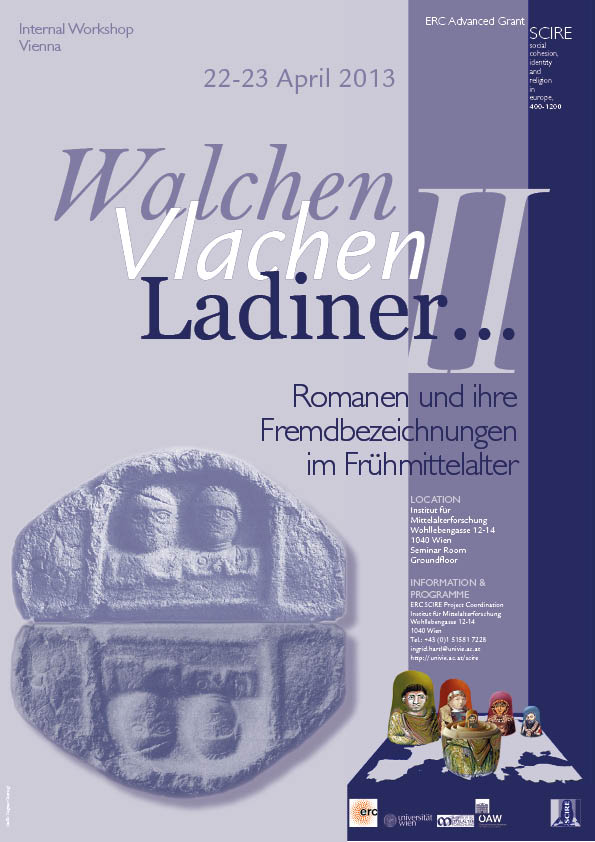
|
Being Roman after Rome 2
Walchen, Vlachen, Ladiner… II
Romanen und ihre Fremdbezeichnungen im Frühmittelalter
Internal Meeting
Institut für Mittelalterforschung • Wohllebengasse 12-14
1040 Wien
Seminar Room • Ground Floor
Programme (PDF)
|
Participants
- Heinz Dopsch (Universität Salzburg)
- Wolfgang Haubrichs (Universität des Saarlandes)
- Georg Holzer (Universität Wien)
- Johannes Kramer (Universität Trier)
- Stergios Laitsos (Universität Wien)
- Max Pfister (Universität des Saarlandes)
- Walter Pohl (Universität Wien, Österreichische Akademie der Wissenschaften)
- Thomas F. Schneider (Universität Bern)
- Peter Wiesinger (Universität Wien)
- Herwig Wolfram (Universität Wien)
- Bernhard Zeller (Österreichische Akademie der Wissenschaften)
▲ up
|
|
21/22March 2013
Workshop
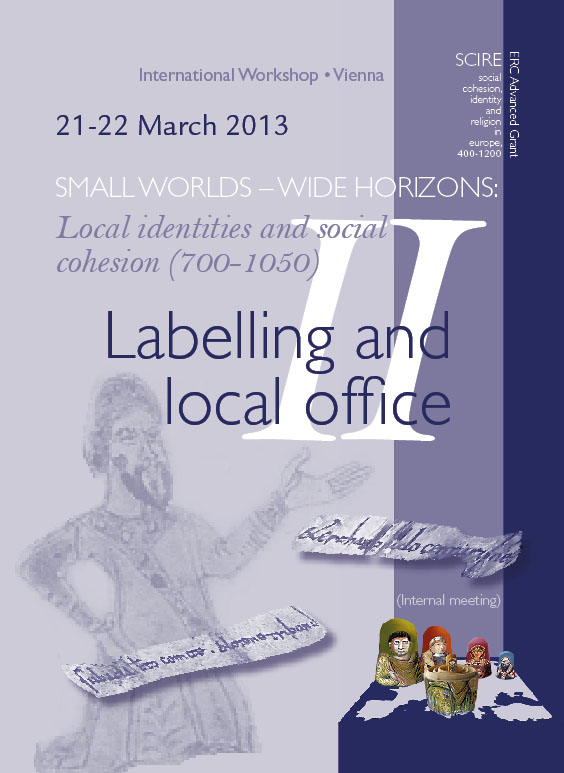
|
Small worlds — wide horizons:
Local identities and social cohesion (700-1050) II
Labelling & local office
Internal Meeting
Institut für Mittelalterforschung • Wohllebengasse 12-14
1040 Wien
Seminar Room • Ground Floor
Programme (PDF)
|
Participants
- Gordon Blennemann (Paris, F)
- Richard Corradini (Wien, A)
- Wendy Davies (London, UK)
- Max Diesenberger (Wien, A)
- Thomas Kohl (Tübingen, D)
- Carine van Rhijn (Utrecht, NL)
- Marco Stoffella (Verona, I)
- Francesca Tinti (Vitoria-Gasteiz, ESP)
- Charles West (Sheffield, UK)
- Bernhard Zeller (Wien, A)
|
|
9-12 July 2012
International
Medieval Congress
Leeds
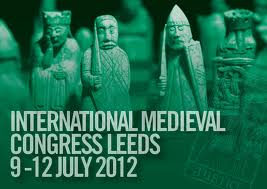 |
Cinzia Grifoni
Session 1110: Texts and Identities, II:
Being Roman in a Post-Roman World
Some Examples from the Early Middle Ages
Roland Steinacher
Session 830: Rules of Violence, IV:
The
(Organised, Staged, or Predictable) Violent Death of the Individual
in Late Antiquity
Francesca Conselvan
Session 1705: Monastic Life in Conflict
with Its Environment
The Settlement of Disputes in the Nunnery of San Sisto
Alexander O’Hara
Session 1010: Texts and Identities, I:
Was there a Columbanian Identity?
▲ up
|
|
18-19 June 2012
International
Conference
Vienna
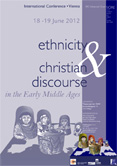
|
Ethnicity & Christian Discourse
in the Early Middle Ages
Location
Theatersaal der ÖAW
Sonnenfelsgasse 19
1010 Vienna
Programme (PDF)
The conference will look at early medieval ethnicity in the context of other identities. In the period when Europe was Christianized, kingdoms named after ethnic groups came to dominate much of Europe. The main interest is to explore the impact of Christianity on the ways in which ethnicity became a political issue in the post-Roman world. Contrary to some interpretations based on Roman perceptions, ethnicity is not simply a barbarian form of social integration, which was established on former Roman territory by victorious barbarians. The bulk of our written sources from the period about ethnic and political matters are more or less inspired by Christian discourses and attitudes. How did Christian discourse shape the contemporary significance of ethnic identities? How did the meaning of ethnicity change during the transition from the Roman empire to a multitude of kingdoms in the West? And which role did other identities play in the reshaping of the political and cultural landscape of medieval Europe?
|
Participants
- Stuart Airlie (University of Glasgow)
- Albrecht Diem (Syracuse University)
- Maximilian Diesenberger (Österreichische Akademie der Wissenschaften)
- Stefan Esders (Freie Universität Berlin)
- Andreas Fischer (Freie Universität Berlin)
- Cinzia Grifoni (Österreichische Akademie der Wissenschaften)
- Yitzhak Hen (Ben-Gurion University of the Negev)
- Gerda Heydemann (Universität Wien)
- Mayke de Jong (Universiteit Utrecht)
- Michael Maas (Rice University)
- Rosamond McKitterick (University of Cambridge)
- Rob Meens (Universiteit Utrecht)
- Hildegund Müller (University of Notre Dame)
- Alexander O'Hara (Österreichische Akademie der Wissenschaften)
- Walter Pohl (University of Vienna, Institute of History & Austrian Academy of Sciences, Director of Institute for Medieval Research)
- Marianne Pollheimer (Österreichische Akademie der Wissenschaften)
- Claudia Rapp (Universität Wien)
- Helmut Reimitz (Princeton University)
- Irene van Renswoude (Universiteit Utrecht)
- Sumi Shimahara (Université Paris-Sorbonne)
- Roland Steinacher (Universität Wien)
- Mark Vessey (University of British Columbia)
- Herwig Wolfram (Universität Wien)
- Ian Wood (University of Leeds)
▲ up
|
|
|
4 June 2012
International
Workshop
Vienna
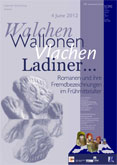
|
Being Roman after Rome 1
Walchen, Wallonen, Vlachen, Ladiner… I
Romanen und ihre Fremdbezeichnungen im Frühmittelalter
Internal Meeting
Institut für Mittelalterforschung • Wohllebengasse 12-14
1040 Wien
Seminar Room • Ground Floor
Programme
|
Participants
- Herwig Wolfram (Universität Wien)
- Wolfgang Haubrichs (Universität des Saarlandes)
- Max Pfister (Universität des Saarlandes)
- Bernhard Zeller (Österreichische Akademie der Wissenschaften)
- Katharina Winckler (Österreichische Akademie der Wissenschaften)
- Stergios Laitsos (Universität Wien)
|
|
|
|
23-24 April 2012
International
Conference
Vienna
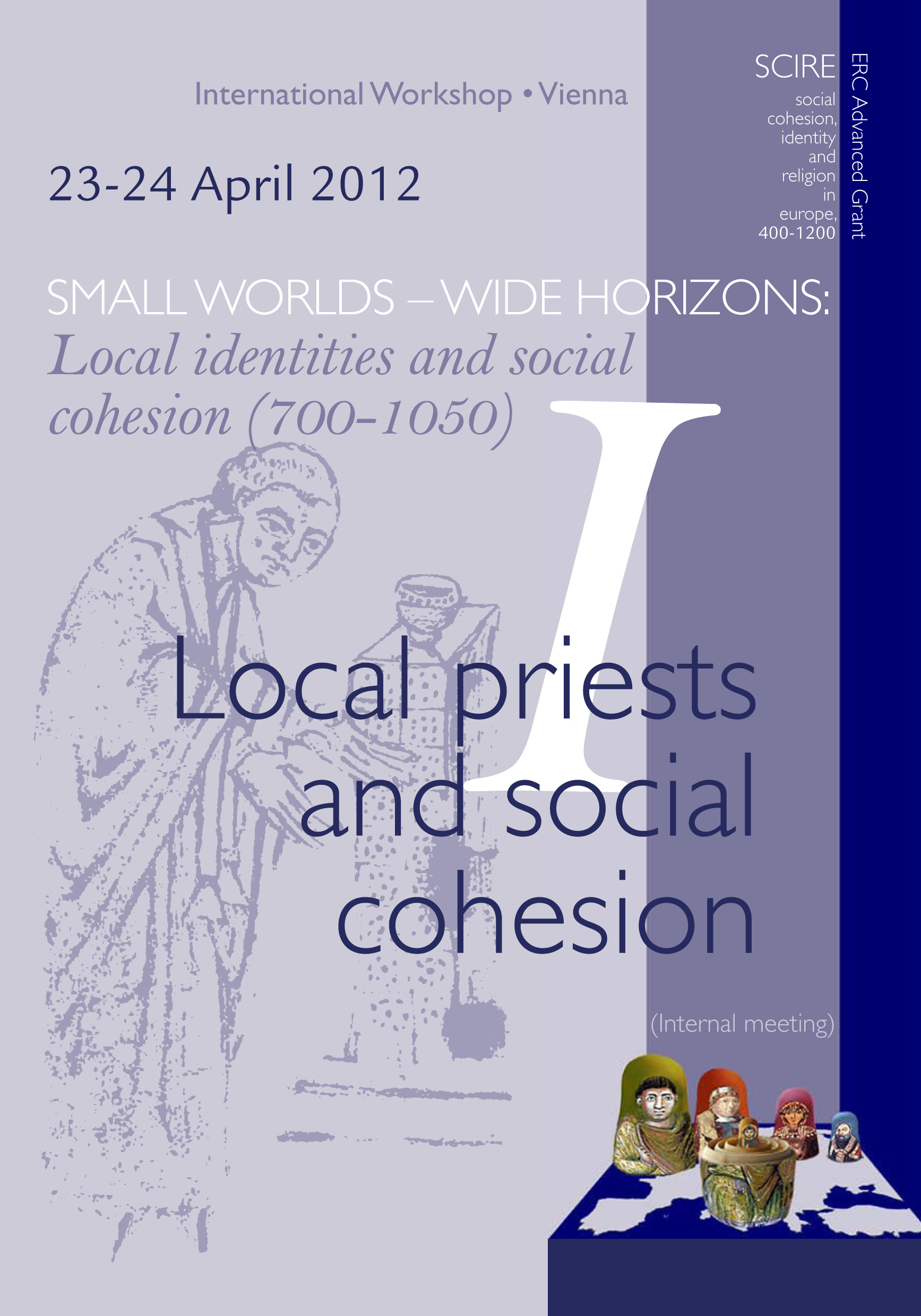
|
Small worlds — wide horizons:
Local identities and social cohesion (700-1050) I
Local priests & social cohesion
Internal Meeting
Institut für Mittelalterforschung • Wohllebengasse 12-14
1040 Wien
Seminar Room • Ground Floor
Programme (PDF)
|
Participants
- Miriam Czock (University of Tübingen)
- Wendy Davies (University College London, London)
- Maximilian Diesenberger (Institute for Medieval Research of AAS, Vienna)
- Thomas Kohl (University of Tübingen)
- Rutger Kramer (Institute for Medieval Research of AAS, Vienna)
- Marco Stoffella (Universitäy of Verona)
- Francesca Tinti (Universidad del País Vasco, Vitoria-Gasteiz)
- Walter Pohl (University of Vienna, Institute of History & Austrian Academy of Sciences, Director of Institute for Medieval Research)
- Bernhard Zeller (Institute for Medieval Research of AAS, Vienna)
- Carine Van Rhijn (University of Utrecht)
▲ up
|
|
|
30-31January 2012
International
Workshop
Vienna
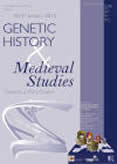
Programm (PDF)
|
History & Medieval Studies — Genetic
Towards a Pilot Project
Public Presentation:
Sitzungssaal der ÖAW, Stiege 1, 1. Stock, Dr. Ignaz Seipel-Platz 2, 1010 Wien
Mon, 30 January 2012, 9.00-12.30
The swift progress of genetic research has opened up new perspectives for the study of history. In particular, recent technological innovations in deciphering the genome in ancient DNA allow posing new questions about the history of populations, following a line of research laid out by Luca Cavalli-Sforza and others but now at a level of detail impossible even a few years ago. However, and in contrast to the refinement of genetic tools, the methodology of drawing historical conclusions from genetic evidence has as yet hardly been discussed. How do we relate the clusters of genetic similarity to historical human groupings? Can DNA analysis help us to detect migrations, demographic processes, ethnic or territorial groups, or family structures?
On the basis of an initiative at UCLA, an international study group of geneticists, archaeologists, anthropologists and historians from the USA, Italy, Hungary, Germany and Austria has formed in order to conduct an exemplary study of early medieval material. The sixth century AD in Central Europe and Italy has the advantage to offer both extensive archaeological evidence from graves with rich apparel and a considerable body of written texts, which can be confronted with the results of genetic testing, and may help to refine the interdisciplinary methodology.
The workshop has two main goals: the first part, on Monday 30/1 morning, will offer a general discussion of the state of the art and the methodological options and problems, while the further proceedings in a more restricted circle will serve to discuss the shape of the planned pilot project.
|
|
Participants
- Csanád Bálint (Hungarian Academy of Sciences, Archaeological Institute)
- Irene Barbiera (University of Padova/CEU Budapest, Department of History)
- Guido Barbujani (University of Ferrara, Department of Evolutionary Biology)
- Francesca Bertoldi (University of Venice, Department of Humanistic Studies)
- David Caramelli (University of Florence, Department of Evolutionary Biology)
- Francesca Conselvan (University of Vienna)
- Falko Daim (Römisch-Germanisches Zentralmuseum Mainz, General Director)
- Patrick Geary (UCLA, Department of History)
- Sauro Gelichi (Università Ca’Foscari Venezia, Department of Ancient and Neareastern Studies)
- Silvia Ghirotto (University of Ferrara, Department of Evolutionary Biology)
- Maria Cristina La Rocca (University of Padova, Department of History)
- Balázs Mende (Archaeological Institute of the Hungarian Academy of Sciences, head of laboratory for Archaeogenetics)
- John Novembre (UCLA, Department of Ecology and Evolutionary Biology)
- Daniel Peters (Deutsches Archäologisches Institut Frankfurt, Roman-Germanic Commission)
- Walter Pohl (University of Vienna, Institute of History & Austrian Academy of Sciences, Director of Institute for Medieval Research)
- Krishna Veeramah (University of Arizona, Biological Sciences)
- Tivadar Vida (Eötvös Loránd University, Department of Archaeology & Archaeological Institute of the Hungarian Academy of Sciences)
- Robert Wayne (UCLA, Department of Ecology and Evolutionary Biology)
▲ up
|

|























